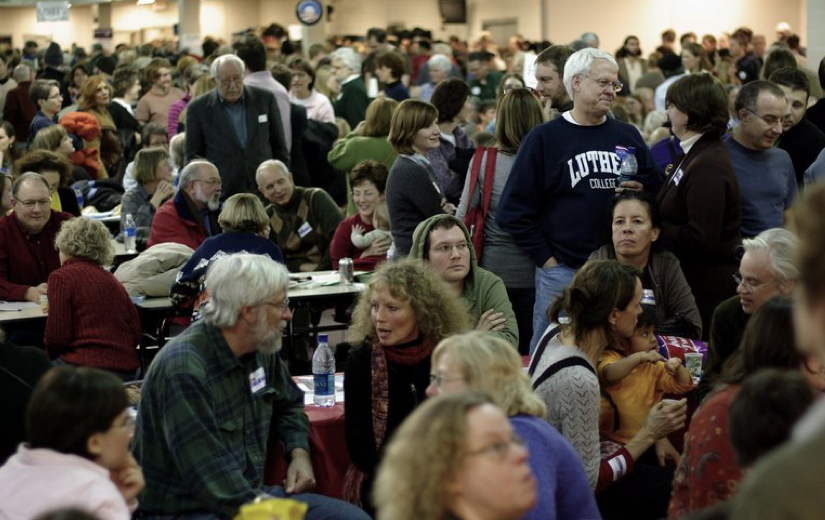Comments
CITYWATCH TODAY--It’s that time again. Every few years, the country’s attention shifts to Iowa, where campaign staffers are currently preparing for the first major contest in the 2020 Democratic presidential primaries.
As of this week, polls suggest a near four-way race, with former Vice President Joe Biden, Sen. Bernie Sanders, former Mayor Pete Buttigieg, and Sen. Elizabeth Warren all within a few percentage points of one another.For pundits and staffers, the biggest question is, of course, who will win. But let’s zoom out for a minute. With so much sweat, preparation, and criticism poured into the Iowa caucuses, what does it actually teach us about our democracy?
Contemporary American civic life is increasingly digitized and depersonalized, and opportunities for actual engagement are dwindling. Election turnout is dismal (the United States ranks 26th out of 32 developed countries), and has been for over a century. You might think we’re politically destined for indifference—until, that is, you hit the ground in Iowa.
The Iowa caucus is unique in the primary process. It's not just a vote-and-go-home deal—it’s participatory and deliberative. Politics are hashed out over pancake breakfasts and midnight sessions around the kitchen table; volunteers attend birthday parties, make sick calls, and give out their personal cell phone numbers. People vote with their feet. They shout and squabble; husbands and wives show up just to cancel each other’s vote. In other words, it’s human politics—and while that gets messy, it also makes Iowa one of the few places in the United States where citizens have a vocal say in their democracy.
So, here are a few lessons from the Iowa caucuses:
First, don’t give up on the value of face-to-face engagement. While the carnivalesque aspects of the caucuses warrant some cynicism and critique (Scarlett Johansson was at my caucus location when I volunteered in 2008), at its best, the Iowa caucus taps into Alexis de Tocqueville’s ideal of “civic voluntarism.” People are empowered through dialogue and deliberation within their community. They take themselves out of their habitual roles and assume new identities in civic political fora.
People vote with their feet. They shout and squabble; husbands and wives show up just to cancel each other’s vote.
Second, democracies should be designed to equitably distribute political and economic power. The caucuses fall woefully short in this regard: Iowa, which is 90 percent white, does not represent the country as a whole—and it fails to give voice to the emerging minority majority clustered in America’s metropolises. The in-person, deliberative process can also exclude voters with disabilities or shift work, or without transportation or childcare. Shifting power to communities of color, working-class communities, and traditionally marginalized groups is crucial—and efforts to do so must stretch beyond simply reforming Iowa or our elections.
Third, the Iowa caucuses’ recent rule changes remind us that democracy is not a static object, but a living organism—one that must adapt and evolve in order to survive. This year, the caucuses will also take place in 99 satellite locations—71 in Iowa, 25 in other states, and three international sites in France, Scotland, and the Republic of Georgia—offering remote Iowans the chance to participate.
Other groundbreaking changes include the release of each candidate’s raw vote count—which could theoretically allow more than one candidate to declare victory—and the addition of preference cards, which will lock supporters of viable candidates into their selected choice.
It remains to be seen whether these changes will make the process more transparent and democratic, or whether they’ll just lead to even more confusion and infighting. Regardless, they illustrate something important: How we structure political processes matters. Rules define the experience of engagement—and the media’s subsequent interpretation of events.
Shifting power to communities of color, working-class communities, and traditionally marginalized groups is crucial—and efforts to do so must stretch beyond simply reforming Iowa or our elections.
Iowa’s larger lesson for U.S. democracy lies not in the quirky caucus math or the onslaught of East Coast elites championing their favorite political horse. Rather, it’s in how to inject higher-quality participation into more aspects of political life—both during and between elections.
For example, could deliberative caucuses be placed throughout the country, especially in traditionally under-resourced communities and rural communities, to ensure more diversity in who gets facetime with elected officials? In between elections, can we build more opportunities for residents to have an active say in the governing process—especially those who are often excluded from traditional civic engagement processes?
Cities around the world are experimenting with methods like participatory budgeting, community councils, and impact volunteering that bring civic power to non-citizens and historically marginalized residents. Such radically different civic infrastructure, as I write in my new book Civic Power with Sabeel Rahman, is needed so to sustain and deepen the opportunity for people to affect policy.
The Iowa caucus has many flaws, and its critiques are warranted. Even so, its spirit can still inspire us to make our democratic processes more inclusive and participatory. No matter who wins, the Iowa caucus demonstrates that there’s plenty of value in engaging directly with “we the people”—and in trusting our democracy enough to constantly challenge, reexamine, and redefine its processes.
(Hollie Russon Gilman writes for newamerica.org … where this piece was first posted.)
-cw














